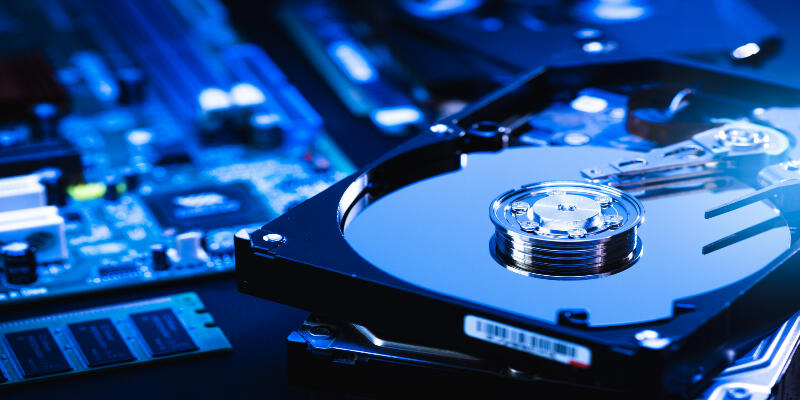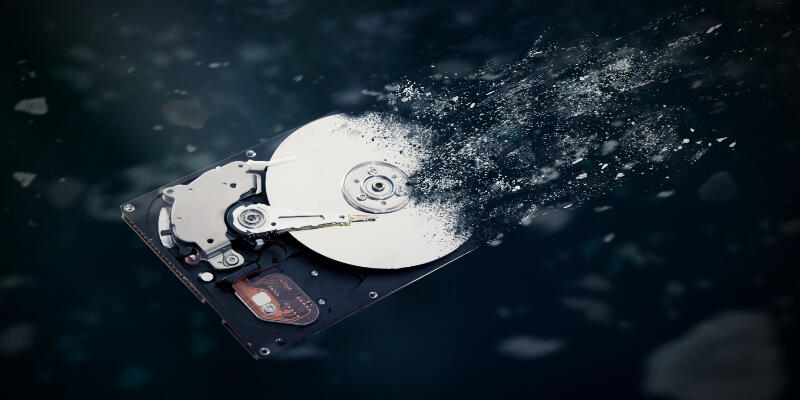Disclaimer: This post may contain affiliate links, meaning we get a small commission if you make a purchase through our links, at no cost to you. For more information, please visit our Disclaimer Page.
Hard drives store the data that we view or work on while we use the computer.
The hard drive is the “memory” of the computer’s CPU, which is the “brain”. As data gets stored and as the computer performs for its users, the hard drive also heats up like the other parts of the computer.
Hard drive needs cooling to function properly. They get hot just like any other component of your computer. It will overheat once placed in an air-tight enclosure in a room without proper ventilation.
In this article, I teach you some of the best tips to keep your hard drive cool to prevent overheating. The tips that I will provide are all based on my experience when repairing and setting up computers for my former clients, and some friends.
Table of Contents
Does Hard Drive Need Cooling?
Hard drives are composed of flat plates that look like discs. These plates are coated with magnetic coating, along with aluminum and glass. The plates contain all your files and can store billions of bytes of data.
Once the computer is turned on, the plates rotate at a speed just like a CD or DVD would. The plates rotate up to 10,000 rpm. Parts of the hard drive called “heads” are used to scan through the plates to read your files, and to give you the ability to edit them.
Hard drives work with their own mechanism, connected to a CPU for it to function using electricity. The hard drive’s plates heat up as it quickly rotates, which is why cooling it is a must!
I made this guide to hard drive cool, along with some extra tips based on my experience in repairs and computer setup.
Why Do Hard Drives Fail?
Permanent damage is the very first thing that I want to remind everyone to avoid at all costs. It is what I want to avoid, which is why I want to provide a complete guide about overheating.
But first, check out the following causes of hard drive failure to avoid permanent damage:
Impact
The hard drive might look like a piece of tough metal. But its insides are very sensitive. So be sure not to drop the hard drive if you’re walking around while holding it.
Human Error
People commit mistakes from time to time. Human error happens when you accidentally pressed an important file on your hard drive. You might have physically damaged the hard drive as well.
Just consider yourself unlucky when this happens.
Corruption
Firmware corruption causes the hard drive to become unreadable by the computer. As a result, the whole system fails to boot up, causing your files to become inaccessible.
After all, the firmware is what helps the computer’s operating system read the files in it.
Power Surges
A power surge may not often cause hard drive failure, but can potentially damage or corrupt some of its files. The computer safely closes some hard drive files during the shutdown phase.
Any sudden power interruption might corrupt the files, particularly those that are still being closed by your computer.
Hardware Failure
The hard drive might have damage or defect on some of the major components that power it up when the computer is turned on. Check your warranty if you can still exchange it if it’s a defect on the hard drive.
Water Damage
Water is known to cause electrical surges, and that counts for hard drives. Though this rarely happens, I will still teach you later the proper setup when cooling your hard drive to prevent this problem.
Overheating
Overheating can damage, if not burn, the components of your hard drive. This is the main topic that I would love to help you out with.
As we go further, you will understand why the hard drives overheat, as well as the best tips on how to prevent it.
Do Hard Drives Overheat?
Since the plates rotate at very high speeds, it gets overworked because of prolonged usage, causing the hard drive to heat up. The heat gradually increases, and with improper setup, it may overheat and cause damage over time.
Symptoms of Hard Drive Overheating
Your hard drive may (or may not – I’ll explain later) show signs of overheating if you notice:
- The infamous “Blue Screen of Death” (BSoD)
- Clicking noise as the computer runs.
- Fans turning and sounding louder than usual.
- Corrupted files.
- Delay in processing such as a bootup.
- Potentially slow access to websites.
Note: This is also caused by other issues shown earlier before we discuss hard drive overheating. Troubleshooting is essential in finding out the root cause of hard drive failure. You can also contact a local technician to get this resolved.
Causes Of Hard Drive Overheating
Now you know the symptoms, you should also learn what are the common reasons the hard drive is overheating. Here are the following:
High Temperature
Computers are often set up in rooms that have good ventilation. Most even use air conditioners, particularly in rooms with many computers, to prevent overheating. During summer, places that lack air conditioning experience overheating.
I had a friend who had an internet cafe years ago. The place does not have any air conditioning, and it lacks proper ventilation due to its location having only one window. Over time, some computers started to act up, with the hard drive overheating and causing the blue screen of death.
Always make sure that the computers are placed in a well-ventilated area. Multiple computers will produce enough heat to add a little bit of temperature to a poorly ventilated room.
Turn on your air conditioning or install a cooling system in your processor if you live in an area where the temperature or climate is hot, particularly during summertime.
Airflow Congestion
Computers require airflow for it to work properly, and to prevent overheating and further damage. This is why computers have multiple fans built in their processor.
You may even add more fans to stabilize the airflow and to make its internal temperature cooler.
If there is congestion in the airflow such as dust or any other obstruction, the heat gets trapped inside the processor. This will eventually overheat everything in the computer, including the hard drive.
Take note that the size of the room and the location of its windows is also needed for proper airflow.
Fan Issues
The exhaust fans of the computer might be malfunctioning or not working at all. If you touch your processor that has a damaged or defective fan, you will notice the heat right away.
Be sure to look at each fan if this occurs to prevent damage to the hard drive.
If the fans are not working, be sure to check their wiring first before replacing them. The wires of the fan might be loose and are not properly plugged into the CPU. If it is still not working despite cleaning the jack itself, replace the fan.
Do Hard Drives Need Airflow?
The airflow of the hard drive is just like how we need oxygen. But in the case of hard drives, if the processor is airtight or lacks proper airflow, the hard drive will overheat. Over time, overheating may cause permanent damage on some of the hard drive’s parts, which can corrupt some (if not all) of your files.
I strictly require you to consider the airflow of your processor first before you use the computer. Check the position of the processor and make sure the back fans of the processor are facing a wide space.
Avoid placing the processor in front of a wall to let the back fans spread the hot air away.
Note: Cleaning your computer twice a year also promotes good airflow. I learned a hard lesson when I was a kid when I noticed my hard drive was heating fast because of dusty back fans.
How Do I Keep My Hard Drive Cool
Here are the only tips that you need to follow to make it possible:
Install Additional Fans
You should install more fans to ensure good airflow inside your processor. The fans should be installed at the front and the back of the device; some of them should be placed near the hard drive.
One to two fans must be installed at the front area of your processor to produce wind to cool the hard drive and other parts of the processor. There should be 2 to 3 fans installed at the back of the processor, which acts as an exhaust fan to release all heat in the processor.
The easily heating processor always has a fan installed at the top of it to prevent it from overheating. You can also do the same for the hard drive to cool it, provided proper installation.
Install A Cooling System
You may do this along with the first tip, or minimize the use of fans in exchange for the cooling system. A cooling system acts as an air conditioning system within your processor.
This guarantees a very low temperature inside the processor, enough to maintain a very low temperature for maximum performance.
There are lots of stores online and near your area that have this nifty hardware. If you want to get it installed, you can check out a lot of guides online to get started. It’s a lengthy process that has a lot of steps, yet very easy to follow.
What Are The Benefits Of A Cool Hard Drive?
A cool hard drive gives you peace of mind because your files will be sure, as well as the following:
- Hardware Longevity – The hard drive will perform well for 5 to 10 years if its cool temperature is maintained since day 1. Permanent damage is also avoided.
- Fast Performance – Your hard drive will have an easy time reading the plates as they rotate, providing a stable performance when loading apps and files when navigating around the computer.
- Saves A Lot of Money – A hard drive is not a cheap investment, and computer repair fees will affect your budget!
Conclusion
Cooling your hard drive is not a very hard task at all. For such a simple thing to accomplish, would you like to spend more on repairs or possible hard drive replacement? Just follow my very easy tips, and you are all good to go!


